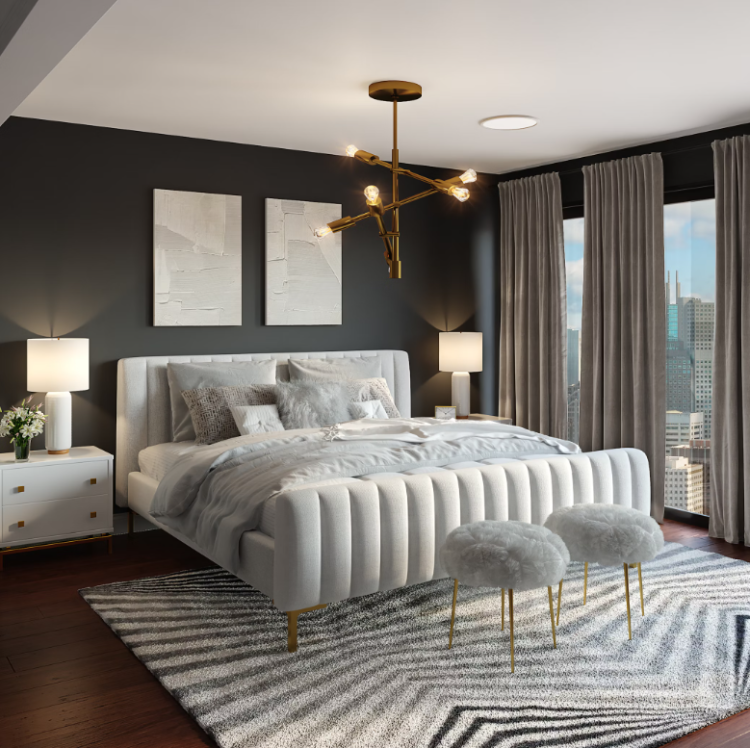In the quest for a harmonious living space, mastering the art of Feng Shui in the bedroom is essential. Feng Shui, an ancient Chinese practice, focuses on creating balance and harmony in our surroundings to promote positive energy flow and enhance overall well-being. In this article, we’ll explore some practical tips for incorporating Feng Shui principles into your bedroom design to cultivate a serene and restful environment.
Introduction to Bedroom Feng Shui
Feng Shui, which translates to “wind-water,” is a traditional Chinese practice that aims to harmonize individuals with their environment. In the context of the bedroom, Feng Shui principles are applied to optimize the flow of positive energy, known as “chi,” to promote restful sleep and overall well-being. By arranging furniture, selecting colors, and integrating natural elements thoughtfully, we can create a space that nurtures both body and soul.
Choosing the Right Bed Placement
One of the fundamental principles of bedroom Feng Shui is the proper placement of the bed. The bed is considered the most critical piece of furniture in the bedroom, as it symbolizes rest and rejuvenation. Ideally, the bed should be positioned diagonally across from the door, with a clear view of the entrance while lying down. This placement allows for a sense of security and command over the space, promoting restful sleep and relaxation.
Creating a Calming Color Palette
Colors play a significant role in Feng Shui, as they can influence the energy flow within a space. When selecting a color palette for the bedroom, it’s essential to choose hues that promote relaxation and tranquility. Soft, muted tones such as soothing blues, gentle greens, and warm neutrals are ideal for creating a calming atmosphere conducive to restful sleep.
Decluttering for Peaceful Surroundings
In Feng Shui philosophy, clutter represents stagnant energy that impedes the flow of chi. To promote positive energy flow in the bedroom, it’s essential to declutter and organize the space effectively. Remove unnecessary items and clutter from the bedroom, keeping surfaces clean and free from obstruction. By creating a serene and uncluttered environment, you can enhance the flow of energy and promote a sense of peace and tranquility.
Incorporating Balance and Harmony
Balance is a fundamental principle of Feng Shui, as it creates a sense of equilibrium and harmony within a space. When designing the bedroom, strive for balance in both layout and decor. Arrange furniture symmetrically, ensuring that no one side of the room feels heavier or more crowded than the other. Incorporate pairs of objects, such as nightstands and lamps, to create a sense of harmony and balance in the space.
Selecting Suitable Bedroom Furniture
The type and placement of furniture in the bedroom can significantly impact the flow of energy. Choose furniture with soft, rounded edges and natural materials to promote a sense of relaxation and comfort. Avoid placing furniture directly in line with the door, as this can disrupt the flow of chi. Instead, position furniture thoughtfully to create a sense of openness and ease within the space.
Enhancing Lighting and Ventilation
Good lighting and ventilation are essential for promoting positive energy flow in the bedroom. Incorporate natural light whenever possible, as it helps to uplift the energy of the space and promote a sense of vitality. Ensure proper airflow and ventilation by opening windows regularly and investing in a high-quality air purifier if necessary. By optimizing lighting and ventilation, you can create a bright, airy bedroom environment that feels fresh and rejuvenating.
Integrating Natural Elements
Bringing natural elements into the bedroom is a key aspect of Feng Shui design. Natural materials such as wood, stone, and bamboo can help to ground the space and connect it with the earth’s energy. Incorporate plants and flowers to add a touch of nature and vitality to the room, promoting a sense of balance and harmony. Choose plants with rounded leaves and soft, flowing shapes to create a sense of tranquility and serenity.
Personalizing with Meaningful Decor
Personalizing the bedroom with meaningful decor items is an essential aspect of Feng Shui design. Display items that hold personal significance, such as photographs, artwork, or sentimental objects. Choose decor items that evoke feelings of joy, relaxation, and inspiration, creating a space that truly reflects your personality and preferences. Avoid cluttering the bedroom with excessive decor, opting instead for a few carefully chosen pieces that uplift the energy of the space.
Promoting Restful Sleep
The ultimate goal of bedroom Feng Shui is to create a space that promotes restful sleep and relaxation. To achieve this, it’s essential to minimize distractions and create a soothing environment conducive to sleep. Invest in a high-quality mattress and bedding that provide support and comfort, and consider incorporating blackout curtains or shades to block out light and create a restful atmosphere. Create a bedtime routine that promotes relaxation, such as dimming the lights, practicing deep breathing exercises, or listening to calming music.
Maintaining Cleanliness and Order
A cluttered and chaotic bedroom can disrupt the flow of energy and inhibit relaxation. To maintain positive energy flow in the bedroom, it’s essential to keep the space clean, tidy, and organized. Make your bed every morning, put away clothes and belongings, and regularly declutter surfaces to create a peaceful and serene environment. By maintaining cleanliness and order in the bedroom, you can enhance the flow of chi and promote a sense of calm and tranquility.
Implementing Feng Shui Cures
In Feng Shui philosophy, cures are remedies used to address specific energy imbalances or challenges within a space. Common Feng Shui cures for the bedroom include placing mirrors to reflect natural light and expanding the sense of space, incorporating crystals to amplify positive energy, and using essential oils or aromatherapy to promote relaxation and well-being. Experiment with different cures to find what works best for your unique bedroom environment.
Adapting Feng Shui to Different Bedroom Layouts
Feng Shui principles can be adapted to suit different bedroom layouts and configurations. Whether you have a small, cramped space or a large, expansive room, there are ways to optimize the flow of energy and create a harmonious environment. Experiment with furniture placement, decor arrangements, and Feng Shui cures to find solutions that work for your specific bedroom layout and enhance the overall energy flow of the space.
Addressing Common Feng Shui Mistakes
While mastering bedroom Feng Shui can have profound benefits for overall well-being, it’s essential to avoid common pitfalls and mistakes. Some common Feng Shui mistakes to watch out for include placing the bed directly under a window, positioning the bed in line with the door, and incorporating too many sharp or angular objects in the bedroom. By being mindful of these common errors and making adjustments as needed, you can maximize the positive energy flow in your bedroom and create a serene and harmonious space.
Conclusion
Mastering the art of bedroom Feng Shui is a powerful way to enhance the energy flow in your living environment and promote overall well-being. By applying Feng Shui principles to your bedroom design, you can create a space that nurtures relaxation, promotes restful sleep, and fosters a sense of harmony and balance. Experiment with different techniques and strategies to find what works best for your unique needs and preferences, and enjoy the transformative effects of a well-balanced and harmonious bedroom environment.

FAQs
- What is Feng Shui, and how does it apply to the bedroom?
Feng Shui is an ancient Chinese practice that focuses on harmonizing individuals with their environment to promote positive energy flow and overall well-being. In the bedroom, Feng Shui principles are applied to create a space that nurtures relaxation, promotes restful sleep, and fosters a sense of balance and harmony.
- What are some essential Feng Shui tips for the bedroom?
Some essential Feng Shui tips for the bedroom include proper bed placement, choosing calming colors, decluttering for peaceful surroundings, and incorporating natural elements. These strategies can help to optimize the flow of positive energy and create a harmonious environment conducive to rest and relaxation.
- How can I personalize my bedroom while still following Feng Shui principles?
You can personalize your bedroom while still following Feng Shui principles by incorporating decor items that hold personal significance, such as photographs, artwork, or sentimental objects. Choose decor items that evoke feelings of joy, relaxation, and inspiration, and avoid cluttering the space with excessive decorations.
- What are some common Feng Shui mistakes to avoid in the bedroom?
Some common Feng Shui mistakes to avoid in the bedroom include placing the bed directly under a window, positioning the bed in line with the door, and incorporating too many sharp or angular objects in the space. Be mindful of these common errors and make adjustments as needed to optimize the energy flow in your bedroom.
- How can I adapt Feng Shui principles to suit my specific bedroom layout?
Feng Shui principles can be adapted to suit any bedroom layout or configuration. Experiment with different furniture placements, decor arrangements, and Feng Shui cures to find solutions that work best for your unique space. Remember to prioritize balance, harmony, and positive energy flow when designing your bedroom environment.






